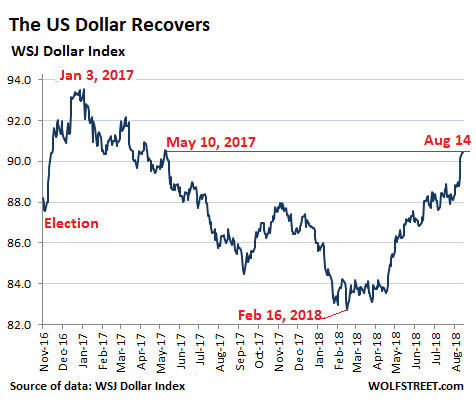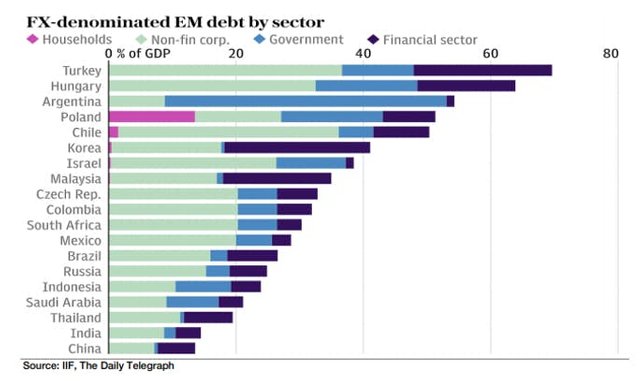Emerging markets get into trouble due to external debt (again)
People in their 40's and 50's will remember the Asian Financial Crisis of 1997/8.
What essentially happened is that a lot of South-East Asian countries (Thailand, Malaysia, Indonesia, South Korea) had pegged their currencies to the US dollar. They had also borrowed a lot of money in dollars (because US interest rates were lowish).
Then the Federal Reserve started hiking interest rates starting in 1994. By 1997, the pain of maintaining the peg got too much. The Thai Bhat broke it's peg and collapsed in value, as did other south-east asian currencies, some more than halving.
And that is when things got tricky. If you have borrowed in dollars, and your currency depreciates against the dollar, it costs you more in your domestic currency to service that debt. You either have to sell more to the USA to earn dollars to pay your debt, or sell dollar assets to pay that debt, or you have to really increase your domestic sales just to raise enough to make your payments. If your currency has halved against the dollar, you have to double your domestic sales just to make your payments. That is pretty much impossible for most businesses.
The lessson that was learned by most of the South-East Asian countries was to have large foreign reserves, so the govts could sell those reserves to buy their local currency to prevent it going down too much.
The other lesson that should have been learned, but wasn't, was never ever borrow in a currency your govt doesn't control, or where you don't have natural business revenues.
But here we are again. Take a look at the following chart:
All those countries have borrowed in a currency they don't control. Most of them have borrowed in dollars, some (Hungary, Poland, Czechia) in euros.
As to why they did it - they were drawn by the low interest rates charged both in dollars and euros. But if your home currency starts to decline against the currency you have borrowed in, you get wiped out. It's safer to pay the higher interest rate and borrow in the currency that most of your revenue earnings are in. But as always people either delude themselves that they will get out in time, or they imagine that currenct conditions are permanent and that there is "no way" that interest rates will rise, that QE will reverse or the dollar would rise.
But the dollar has indeed been rising as the Fed raises inrterest rates.
Here is a graph of the dollar against a basket of other currencies:

A combination of a rising dollar and rising interest rates (which make it expensive to roll over debt) has got Turkey into trouble.
If the euro similarly rises against the Polish zloty or Hungarian forint, those two countries will be in trouble too.
The only ones who will survive are the ones whose govts have large foreign exchange reserves that they can use to prevent their currencies from crashing (Korea, Malaysia, Indonesia, Saudi, Thailand, India and China).
The rest are in for a world of pain.

Yes you are right bro upvote and comment back in my post https://steemit.com/all/@teachyou/bitcoin-explained